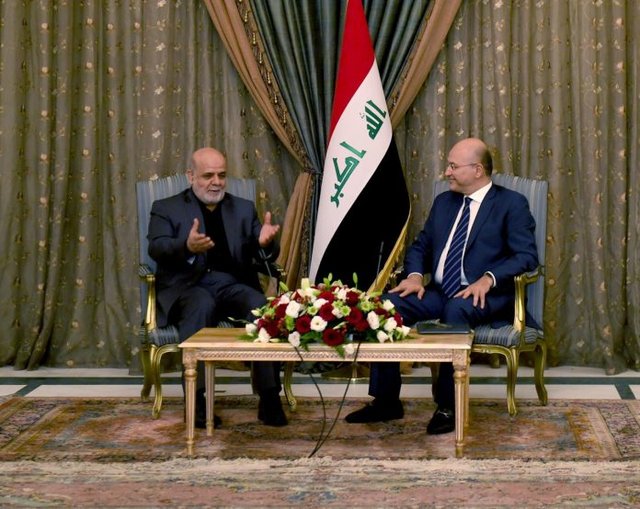Iran and Iraq have had tense relations for decades, but that has not prohibited the two Middle Eastern countries from trying to get cozy in recent years. Despite such efforts, some Iranian parliamentarians are convinced that external powers are trying to disrupt bilateral relations.
“Some try to disrupt friendly ties between Iran and Iraq, but it will never happen,” Iranian speaker Ali Larijani told his Iraqi counterpart Mohammed Rikan Hadeed al-Halbousi on the sidelines of the Third Eurasian Summit in Antalya, Turkey on October 10, according to Iran’s Azad News Agency.
“Because, after the downfall of Saddam, Iraq has supported Iran, so the bilateral relations between the two countries should be strengthened,” he added. “Both U.S. and Zionist regime try to misuse the region, but they will not achieve their goals.”
Larijani said Iran is ready to help Iraq reconstruct the war-torn country, adding that there are many Iranian companies that can broaden cooperation with Iraq in industry and agriculture.
The United States ousted Saddam Hussein in 2003 and helped build a democratic government in Baghdad, which it wants to see comply with new American economic sanctions on Iran. Following U.S. President Donald Trump’s announcement in May that he will be pulling the U.S. out of the Iranian nuclear deal, Washington began to re-implement tough economic measures. However, Iraq’s political parties, particularly Shiites, have close ties with Tehran with which they are not comfortable rupturing.
Despite the pressures, economic ties between the two neighbors have increased. Iran is now Iraq’s third biggest trade partner after Turkey and China. Iran-Iraq trade amounted to $4.56 billion in the six-month period lasting March 21 to September 22, showing a 31-percent growth in value, according to the Iranian financial website Eghtesad Online.
Last week a two-day Iran-Iraq Road Transportation Forum kicked off in Tehran that was attended by commercial, economic and political officials from the two countries, as well as people active in the international road transportation of cargo and passengers. The ways of eliminating problems concerning the loading and unloading of cargos at border crossings, customs duty fees, freight insurance and transit routes were discussed.
Transportation is not the only for mutual cooperation, however.
The head of Iran-Iraq Chamber of Commerce, Yahya Al-e Es'haq, stated on October 8 that, “the groundwork for establishing a joint bank is ready.” Es’haq said that the joint bank is to be run based on the rules of the Iranian and Iraqi central banks so as to ease money transfer.
Meanwhile, Jaafar al-Rasoul al-Hamdani, head of the Federation of Iraqi Chambers of Commerce, said easing money transfers is one of the most important factors in boosting economic relations.
On October 7, newly elected Iraqi President Barham Salih met with Iranian Ambassador to Iraq Iraj Masjidi. Their meeting comes as the U.S. pressures Iraq to comply with new sanctions on Iran. On October 2, Iraq’s parliament elected Salih as a new president who is from the Patriotic Union of Kurdistan.
During the meeting, Salih praised the two countries' bilateral relations, saying, "developing interaction among regional countries will be to the advantage of Iraq and the whole region," Iranian Students News Agency reported.







 Azerbaijan and Armenia started the process of demarcation of their border on Tuesday, with the installation of the first border markers based on ge...
Azerbaijan and Armenia started the process of demarcation of their border on Tuesday, with the installation of the first border markers based on ge...
 President Aliyev emphasized the critical role of the North-South Transport Corridor in fostering transport cooperation between Azerbaijan and Russi...
President Aliyev emphasized the critical role of the North-South Transport Corridor in fostering transport cooperation between Azerbaijan and Russi...
 Armenian sappers commenced on Monday mine-clearance operations in the territories adjacent to the Saint Mary Church in village of Voskepar (Armenia...
Armenian sappers commenced on Monday mine-clearance operations in the territories adjacent to the Saint Mary Church in village of Voskepar (Armenia...
 Russian Foreign Minister Sergei Lavrov has reasserted that Moscow has no intentions to stop the fighting in Ukraine, even if peace talks commence.
Russian Foreign Minister Sergei Lavrov has reasserted that Moscow has no intentions to stop the fighting in Ukraine, even if peace talks commence.



